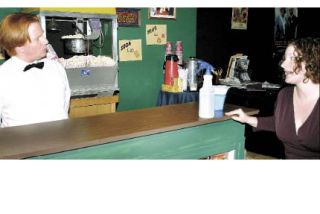Late one night after rehearsal last week, Changing Scene artistic director Pavlina Morris looks a bit anxious, almost nervous as she surveys the set of their latest production “Contrived Ending.”
The small core of actors have emptied out of the theater. Morris is standing alone, looking at the well-crafted black box stage-turned-independent movie house lobby and talking about the upcoming show.
It’s not anxiety for the performance in her demeanor. It looks as though something has been weighing heavy on her mind for quite some time, even more so than the typical months-long stress of directing a main stage production. It looks like something has been tugging at her heart.
It seems there’s something about this play and its contrived ending.
While of course, you’ll have to see the show to see the ending, suffice to say “you can’t come out of this play and not talk about it,” Morris notes.
There are basically two types of theater out there, she goes on to describe, theater for the escapee and theater for the intellect. While she’s a big fan of each, it seems that the Changing Scene has quite an appetite for producing theater that makes you think.
“It’s important that we stay sharp, and I think the theater is a good place for that,” Morris said. “Now is one of the times when we need to be thinking, not escaping.”
With that ideal, despite the box office butterflies that accompany producing unknown works, she and the Changing Scene will debut the Northwest regional premiere of an original contemporary drama from an author many people have likely never heard before … and asking them to think.
Denver playwright Josh Hartwell’s slice of life drama, “Contrived Ending,” is an intimate look at the crisis of the 20-something generation in today’s world, through the vehicle of a “Clerks” meets “Empire Records” at the movie theater type of comedy.
The humanity of Hartwell’s characters set his script apart. Jack (Kyle Boyton), high school graduate and usher at the local art house, gets one of his old friends, film-school drop out Nathan (Darren Hembd), a job at the refreshment counter. The story creates a portrait of the young 20-somethings, competing for the affection of the hip-girl ticket taker Laurel (Kenadi Lewis), staving off advances from the boss lady Wendy (Wendy Daniels) and picking on the box office nerd Shane (Josh Pine).
Morris noted the group as a microcosm of this struggling movie theater, which is a microcosm of the bigger film industry fighting to survive against home theaters and Netflix. And it’s all being staged at a live theater.
Irony at its finest.
Underneath all the ironic quips and many, many film references, it’s a story poignant for all ages, Morris said. Easily accessible through Hartwell’s very “human” dialogue.
“Even for the 50- and 60-year-old crowd, they’re far from their 20s, but if they take a look at this, I think they are going to realize that this is a generation in peril,” Morris noted. “Because it really is.”
The 30- and 40-something generation will likely relate and see some of the same, Morris said (noting herself as part of that age group), “hopefully realizing that they have the power to influence and possibly help these guys.”
For the 20-somethings, needless to say, it should be easy to identify with each of the characters.
But it wasn’t so easy to round up a cast of 20-something thespians to stage this production, Morris said.
“It’s pretty scary,” she said. “It’s really scary actually.”
Morris has been directing in the area and working with young local talent since the founding of Changing Scene Northwest in 2002. She’s also been contracted to direct a few productions at Bremerton High School in recent years, and through that contact, she’s seen the talent pool of young thespians decreasing over the years.
It is encouraging, she said, to see the local theater groups, like CSTOCK, WWCA and the Bremerton Community Theatre, sustaining and creating programs that keep the youth involved.
“But everybody’s got to continue doing that, or in five years, there’s going to be no talent pool for us to draw from,” Morris forecasted.
How’s that for a contrived ending?



